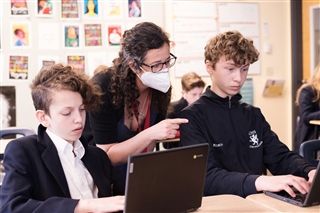With the explosion of public interest in readily available Artificial Intelligence (AI) tools such as ChatGPT, Dall-E 2, Lensa AI, NightCafe, and Tome, it seems as though we may be on the cusp of a paradigm shift in educational settings. While both excited and terrified simultaneously, teachers and students alike are exploring how these OpenAI tools will fundamentally change what they are doing in classrooms and other learning spaces. “This has the potential to revolutionize the learning and teaching experience in my classroom the way calculators did for mathematics,” says Clint Lundgren, one of our exceptional Senior School faculty members. Clint has been served Glenlyon Norfolk School (GNS) for years, teaching English and the Diploma Programme’s Language & Literature and Theory of Knowledge (TOK) courses, the latter being unique to the International Baccalaureate and requiring students to dig into themes centred on Ways of Knowing and Areas of Knowledge and encourages them to debate topics from various perspectives. Naturally, courses such as TOK are prime launching points for class discussions around how AI systems might disrupt an IB education. Students have been exploring the issue in open conversations. As many educational institutions grapple with decisions around trying to outright ban the use of bots or other forms of AI, others are choosing to try and understand how the tools can be used to save time, increase or deepen impact, reshape our work, connect more people, and make positive differences in the lives of others. At GNS, we believe there will be some serious potential upside to accessing AI applications both in the teaching and learning aspects of school life, but also in areas like marketing and communications, organization, planning and data use. There will undoubtedly be some downside too— perhaps in ways we all have yet to consider. Taking a hard stand against AI (including using ChatGPT to assist with assignment completion) is not a realistic plan. If we want to prepare students for the future, we can’t simply ban it or shelter our students from it. Teachers of earlier generations may recall how exciting forms of technology like Scantron machines “revolutionized” their marking and ability to offer timely feedback on student assessment. Only a few short years ago, educators were making decisions about students’ use of technology for identifying and autocorrecting the misuse of spelling, capitalization, punctuation, and grammar. Even within the last decade, faculty questioned the extent they should be permitting technology’s use for screenshotting of notes, sharing of resources, writing with speech-to-text software and collating and formatting references. What was once so concerning for educators is all pretty standard practice in their work now. Photomath, Pic Inspect, Grammarly, Google Translate and Google Lens (or earlier versions) have been used by students for the last few years and many phones now have “homework assistance” automatically built into Artificial Reality (AR) functions or the cameras in their cellphones. My own phone update seems now to have Google Lens integrated complete with a “homework” option. The bottom line is, our students will have access to these tools whether we, as a school, provide it to them or not. So, what next? At GNS, we have confidence in our faculty to find ways to integrate AI into teaching and learning. We also believe in their ability to consider ways of assessing students’ work without the students accessing technology in any form, if that is the experience they intend for the lesson at hand. We will explore the topic, and the uses and impact of artificial intelligence right along with our students. An upcoming Curriculum Leaders Meeting has included the agenda item: “AI/ChatBots – How do we engage with the new member in the classroom?” Early conversations around the staffroom included an expression of worry that students’ use of AI to generate original content in stories, essays, poetry, reports, artwork, and presentations may take away from the learning process and the effectiveness of students’ abilities to develop and demonstrate specific skills. Some teachers noted that -although work created by bots may tend to mimic what is already present in our society, it may not feel as personal or authentic to the user or audience. Some questioned if students had used AI to create even rough drafts of work and they were then tasked with demonstrating the same skill or understanding in another context or a second time without the use of technology, could they even retain the knowledge or replicate the level of work? Forced to ponder the decreasing importance of what you know and the growing importance of how you know was the takeaway for me. This leads me to wonder: if it isn’t a person actually doing the work, how personal and perhaps more importantly, how purposeful is the work and has there actually been any personal growth? A great deal of mental wellness relates to one’s feeling of a sense of purpose. A long day of meaningful work tends to leave me with a sense of accomplishment, pride and excitement for what is to come next. Personally, though using bots to reduce my workload in some ways sounds really appealing, I worry it will also diminish my sense of who I am and what I feel I can offer. Accessing AI tools to reduce my workload could over time have the potential to change the way I feel about my personal contribution to society and consequently, reduce my own sense of self-worth. Writing this next line with tongue in cheek– Luckily, there are artificial Intelligence tools designed to even help with that! Apps like Woebot Health are designed to put individuals in timely correspondence with a safe, caring, listener to reduce stress and anxiety; albeit the individual on the other end of the chat is an autonomous program bot. Alas, this world that is so heavily dependent on technology is rapidly changing. So, how does this all relate to the academic environment at GNS? Over the next few weeks, we will look at how Glenlyon Norfolk School’s delivery of a premier school experience, grounded by the continuum of the world’s best educational model, that being the International Baccalaureate Programme, is entirely adaptable to the changing times that come with the rise of artificial intelligence. It is future-proof. One might ask, How so? We’ll explore that next week.
Related Posts

Why Every Student Should Participate in Model UN
As you’re probably aware, there’s a significant amount happening around the world right now. We stand at a crossroads,...

Meet The Team: Ms. Gottfried
What made you want to be part of the GNS community? There are many reasons that made GNS appealing...

Grade 4 Students Break Codes to Discover Who We Are
Grade 4 students have stepped into the role of “code breakers” as part of their current IB PYP Unit...


